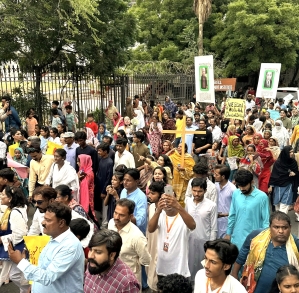
On the eve of Pakistan’s annual National Minorities Day, a human rights advocate on Sunday (Aug. 10) called on parliament to address an alarming increase in false blasphemy allegations.
With most rallies and seminars for the annual Aug. 11 National Minorities Day taking place on Sunday (Aug. 10) to ensure greater participation, Samson Salamat, chairman of rights group Rwadari Tehreek (Movement for Equality), told a forum at the Lahore Press Club that the parliament should hold a “Grand Dialogue” to discuss the spike in false allegations of blasphemy leading to mob violence.
“We demand the government constitute a judicial inquiry commission to investigate the ‘blasphemy business group’ and similar gangs entrapping innocent people in blasphemy cases,” Salamat said, “and to reveal the truth behind all the incidents of violence on Christians from the burning of Shantinagar in 1997 to Jaranwala tragedy in August 2023 and mob lynching of Nazeer Masih Gill in Sargodha in May 2024.”
Participants demanded the government ensure the protection of religious minorities; take punitive action against Muslim extremist groups involved in hate mongering and instigation of violence against vulnerable religious communities; and take practical steps to eradicate biases and hate material in school curriculum. Rwadari Tehreek organized the forum to express solidarity with victims and survivors of religious discrimination and persecution and to draw the government’s attention to issues facing minority communities.
In the southern port city of Karachi, Christian rights advocate Luke Victor told a rally that Pakistan has been officially observing Aug. 11 as National Minorities Day since 2009, yet minority communities still face discrimination, denial of basic facilities and the forced religious conversions.
“Even after 78 years of independence, we don’t feel free because our young daughters are forcefully converted and married off, because our children don’t get equal chances and because we are looked down upon,” Victor said. “We want freedom from discrimination and freedom from being called ‘Chuhra’ or ‘Bhangi’ [pejorative terms used for Christians]. We are all equal citizens of this country.”
The National Minorities Day is observed on Aug. 11 to honor Pakistan’s religious minorities who have contributed to creating Pakistan and in nation-building. It commemorates the speech of Pakistan’s founding father Muhammad Ali Jinnah to the legislature on Aug. 11, 1947, days before Pakistan separated from India, in which he pledged to protect the rights of non-Muslims in the newly created country. The government declared Aug. 11 as National Minorities Day in 2009.
In Karachi, a large number of people belonging to various minority groups participated in a Minorities Rights March on Sunday. They demanded a minimum 10 percent quota for minority students in all educational institutions, removal of discriminatory content from textbooks, constitutional recognition of minorities’ distinct identity, protection of places of worship and properties, criminalization of forced conversions, amendments to personal laws and revision of Articles 41 and 91 of the Constitution to allow minorities to run for the offices of president and prime minister.
They also sought greater political representation at the federal, provincial and district levels, measures for economic empowerment, protection against misuse of religious laws and inclusion of minorities in policymaking.
Safina Gill spoke about job discrimination and the quota system. She said that menial jobs such as those of sanitation workers are reserved for non-Muslims.
“Even educated non-Muslims are offered sanitation worker jobs through newspaper advertisements,” she said.
In 2009, the late federal minister for minorities Shahbaz Bhatti introduced a 5 percent job quota for minorities, which gradually dropped, Gill said.
“The terms and conditions to meet job criteria are made extra tough for non-Muslims even if they are eligible,” she said. “We need new policies to address such issues.”
At the Lahore Press Club forum, Katherine Sapna of legal group Christians’ True Spirit called for comprehensive and effective legislation to criminalize forced faith conversions of girls and boys belonging to Christian and Hindu communities.
Christian socio-political activist Rafaqat Sahotra demanded that the procedure to fill seats for minorities in parliament should be reformed.
“The government, political parties and other stakeholders should work on a scheme that involves the minority voters to elect their representatives in the national and provincial assemblies,” Sahotra said at the Lahore forum. “The current system of proportional representation practically takes away the democratic powers and rights from the voters to elect their minority parliamentarians and instead empowers the political parties and political elite without following any fair process, procedure or merit.”
The Minorities Alliance Pakistan (MAP) seminar held in the federal capital of Islamabad on Aug. 11 (Monday) also focused on the need for effective representation of minorities in provincial and national legislative assemblies.
“We demand amendments to Articles 36, 40, 51, 91, 106 and 203 of the Constitution so that the Pakistani minorities’ population of over 10 million can be freed from the constitutional discriminatory treatment and from restrictions on holding constitutional offices, and can live as equal and equivalent citizens in the country,” said MAP Chairman Akmal Bhatti.
Bhatti said he regretted that major political parties and their leaders had failed to fulfill the trust placed in them by their voters and have done nothing in practice to give minorities equal constitutional status.
Demanding an increase in the number of seats for minorities in the national and provincial assemblies according to the latest population census, the MAP chairman said that proportional representation of non-Muslims for reserved seats should also be changed to strengthen the democratic system.
In statements marking National Minorities Day, Pakistan President Asif Ali Zardari and Prime Minister Shehbaz Sharif reaffirmed their commitment to protecting the rights of minorities while acknowledging their contributions to the country.
“This day reflects Quaid-i-Azam Muhammad Ali Jinnah’s vision of a Pakistan where every citizen lives in equality, harmony and mutual respect,” Zardari said.
He said that Pakistan stands resolutely against all forms of discrimination, extremism and religious intolerance.
“We remain determined to build a society free from prejudice – one that embraces diversity as a strength and is anchored in mutual respect, interfaith harmony and shared progress,” Zardari added.
Prime Minister Sharif also reaffirmed the government’s commitment to the full inclusion of minorities in government institutions, parliament and the national mainstream.
“The welfare and well-being of all minorities in Pakistan, be they Sikhs, Christians, Hindus (or) Parsis, is one of the priority duties of the government of Pakistan,” he said.
He emphasized the services rendered by minorities “in every walk of life,” including those who had sacrificed their lives defending Pakistan.
“We pay tribute to them from the bottom of our hearts,” he said. “Pakistan is proud of its minorities’ patriotism, professional hard work and attachment to national heritage and culture.”
The prime minister also stressed that protecting minority rights, aside from a constitutional obligation, was also a religious duty, saying, “Islam specifically advocates the protection of civil, religious and social rights of minorities. Scholars and religious leaders play a key role in protecting religious freedom.”
He called on all Pakistanis to practice unity and solidarity, mutual respect and tolerance.
Pakistan ranked eighth on Open Doors’ 2025 World Watch List of the most difficult places to be a Christian.





